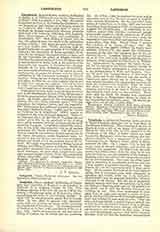

Langenieux, BENOIT-MARIE, Cardinal, Archbishop of Reims, b. at Villefranche-sur-Saone, Department of Rhone, 1824; d. at Reims, January 1, 1905. He studied humanities in Paris at St-Nicolas du Chardonnet, under Dupanloup; and theology at St-Sulpice, where he was ordained, 1850. After nine years as curate at St Roch, he became successively diocesan promoter 1859; cure of St-Ambroise, 1863; then of St-Augustin, 1868; Vicar-General of Paris, and archdeacon of Notre-Dame, 1871. Made Bishop of Tarbes, 1873, he was, the following year, translated to the archiepiscopal See of Reims. The thirty-one years of his episcopate were fruitful ones. Beside obtaining from the French legislature an appropriation of two millions of francs for the restoration of Reims cathedral, he secured for the Trappists the ancient Abbey of Igny, and for the Oratorians the priory of Binson, erected at Chatillon the colossal statue of Urban II, whose cultus he had promoted in Rome, built in the suburbs of his metropolis the churches of Ste-Genevieve, St-Jean-Baptiste de La Salle, St-Benoit, and Ste-Clothilde, this latter being afterwards made the seat of an archconfraternity of prayer for France, and the place of celebration of the fourteenth centenary of Clovis‘s baptism. When the law of school secularization came into effect, he filled his see with Catholic schools and founded four asylums for orphans. Created cardinal in 1886, he presided as papal legate over the Eucharistic Congresses of Jerusalem, Reims, and Lourdes.
A champion of every noble cause, he took an active part in the beatification of Joan of Arc, the panegyric which he pronounced at Orleans, 1885, being most eloquent. He fought vigorously the, anti-religious legislation that was being prepared against Christian education, the religious orders, and the concordat. His “Declaration des Cardinaux et expose de la situation faite a l’eglise de France” (1892), and his “Lettre au President de la Republique” (1904), remain as witnesses to his truly episcopal character. However, he cherished above all the title of “Cardinal des ouvriers” given him by the gratitude of the working class, whose interests, spiritual and material he never ceased to champion. Langenieux enjoyed the friendship of Leo XIII, who consulted him on all matters concerning the Church in France. The universal esteem in which he was held was abundantly proved by the many decorations which European rulers bestowed on him and by the vast concourse of bishops, priests, and people at his two jubilees and at his funeral. His eulogy was pronounced by Bishop Latty, of Chalons, and Bishop Touchet, of Orleans. Beside the pamphlets mentioned above and a number of occasional discourses, we have from Langenieux’s pen: eight pastoral letters (Tarbes, 1873); 231 mandements (Reims, 1874-1905); and “Abrege de l’Histoire de la Religion” (Paris, 1874).
J.F. SOLLIER

